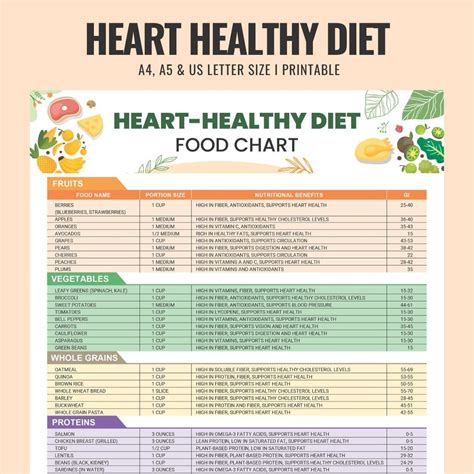Intro
Discover a heart healthy diet plan with nutrient-rich foods, emphasizing omega-3 fatty acids, antioxidants, and fiber to reduce cardiovascular risk and promote overall wellness.
A well-planned diet is essential for maintaining a healthy heart. With the increasing prevalence of heart disease, it's crucial to understand the importance of a heart-healthy diet plan. A diet rich in nutrients and low in unhealthy fats can help reduce the risk of heart disease, lower blood pressure, and improve overall health. In this article, we'll delve into the world of heart-healthy eating, exploring the benefits, key components, and practical tips for implementing a heart-healthy diet plan.
The importance of a heart-healthy diet cannot be overstated. A diet high in saturated and trans fats, sodium, and added sugars can increase the risk of heart disease, while a diet rich in fruits, vegetables, whole grains, and lean protein can help reduce this risk. By making informed food choices, individuals can take control of their heart health and reduce the likelihood of developing heart disease. With the right guidance, anyone can create a personalized heart-healthy diet plan that suits their needs and preferences.
A heart-healthy diet plan is not just about restricting certain foods, but also about incorporating a variety of nutrient-dense foods into your diet. By focusing on whole, unprocessed foods, individuals can provide their bodies with the necessary building blocks for optimal health. From the Mediterranean diet to the DASH diet, there are numerous heart-healthy diet plans to choose from, each with its unique benefits and guidelines. In the following sections, we'll explore the key components of a heart-healthy diet plan, including the benefits of different foods, meal planning strategies, and tips for maintaining a healthy lifestyle.
Understanding the Key Components of a Heart-Healthy Diet Plan

A heart-healthy diet plan typically consists of a variety of foods from different food groups. The key components of a heart-healthy diet plan include:
- Fruits: rich in vitamins, minerals, and antioxidants, fruits are an essential part of a heart-healthy diet. Aim for a variety of colorful fruits, such as berries, citrus fruits, and apples.
- Vegetables: like fruits, vegetables are rich in vitamins, minerals, and antioxidants. Dark leafy greens, bell peppers, and carrots are all excellent choices.
- Whole grains: whole grains, such as brown rice, quinoa, and whole wheat bread, provide fiber, vitamins, and minerals.
- Lean protein: lean protein sources, such as poultry, fish, and legumes, are essential for building and repairing tissues.
- Healthy fats: healthy fats, such as those found in nuts, seeds, and avocados, are essential for heart health.
Benefits of a Heart-Healthy Diet Plan
A heart-healthy diet plan offers numerous benefits, including: * Reduced risk of heart disease * Lower blood pressure * Improved cholesterol levels * Weight management * Improved overall healthMeal Planning Strategies for a Heart-Healthy Diet Plan

Meal planning is an essential part of a heart-healthy diet plan. By planning your meals in advance, you can ensure that you're getting the nutrients you need while avoiding unhealthy foods. Here are some meal planning strategies to consider:
- Plan your meals around whole, unprocessed foods
- Incorporate a variety of colors on your plate to ensure a range of vitamins and minerals
- Cook at home using healthy cooking methods, such as grilling, roasting, and steaming
- Avoid eating out or ordering takeout, which can be high in unhealthy fats, sodium, and added sugars
Tips for Maintaining a Healthy Lifestyle
In addition to following a heart-healthy diet plan, there are several tips for maintaining a healthy lifestyle, including: * Staying hydrated by drinking plenty of water * Engaging in regular physical activity, such as walking, jogging, or swimming * Getting enough sleep, aiming for 7-8 hours per night * Managing stress through techniques, such as meditation, yoga, or deep breathingCommon Mistakes to Avoid on a Heart-Healthy Diet Plan

While following a heart-healthy diet plan, there are several common mistakes to avoid, including:
- Consuming too much sodium, which can increase blood pressure
- Eating too much saturated and trans fat, which can increase cholesterol levels
- Not getting enough fiber, which can lead to constipation and other digestive issues
- Not staying hydrated, which can lead to fatigue, headaches, and other symptoms
Overcoming Challenges on a Heart-Healthy Diet Plan
Despite the benefits of a heart-healthy diet plan, there are several challenges to overcome, including: * Cravings for unhealthy foods, such as sweets or salty snacks * Difficulty finding healthy options when eating out or ordering takeout * Struggling to stay motivated and on track with your diet planStaying Motivated on a Heart-Healthy Diet Plan

Staying motivated is essential for maintaining a heart-healthy diet plan. Here are some tips for staying motivated:
- Set realistic goals and celebrate your achievements
- Find healthy alternatives to your favorite unhealthy foods
- Get support from friends, family, or a registered dietitian
- Track your progress and reflect on your successes and challenges
Conclusion and Next Steps
In conclusion, a heart-healthy diet plan is a powerful tool for maintaining a healthy heart and reducing the risk of heart disease. By understanding the key components of a heart-healthy diet plan, incorporating meal planning strategies, and avoiding common mistakes, individuals can take control of their heart health. Remember to stay motivated, overcome challenges, and celebrate your successes along the way.What are the key components of a heart-healthy diet plan?
+A heart-healthy diet plan typically consists of a variety of foods from different food groups, including fruits, vegetables, whole grains, lean protein, and healthy fats.
How can I stay motivated on a heart-healthy diet plan?
+Staying motivated on a heart-healthy diet plan requires setting realistic goals, finding healthy alternatives to your favorite unhealthy foods, getting support from friends and family, and tracking your progress.
What are some common mistakes to avoid on a heart-healthy diet plan?
+Common mistakes to avoid on a heart-healthy diet plan include consuming too much sodium, eating too much saturated and trans fat, not getting enough fiber, and not staying hydrated.
We hope this article has provided you with a comprehensive understanding of heart-healthy diet plans and the benefits they offer. By incorporating the tips and strategies outlined in this article, you can take control of your heart health and reduce your risk of heart disease. Remember to stay motivated, overcome challenges, and celebrate your successes along the way. If you have any questions or comments, please don't hesitate to reach out. Share this article with your friends and family to help them take control of their heart health, and let's work together to create a healthier, happier community.
